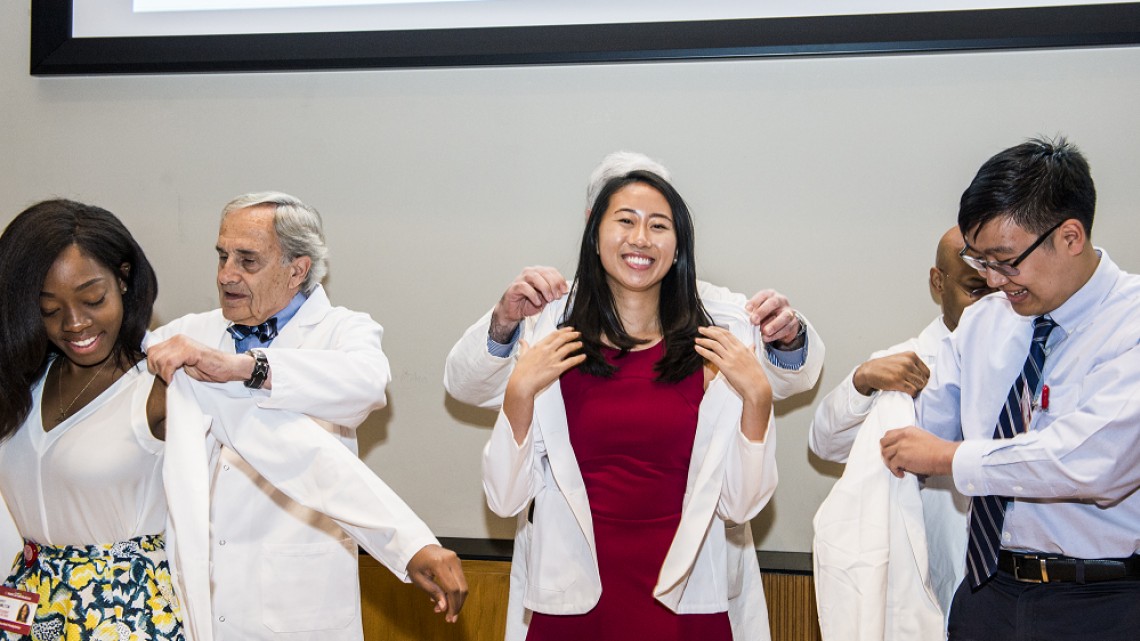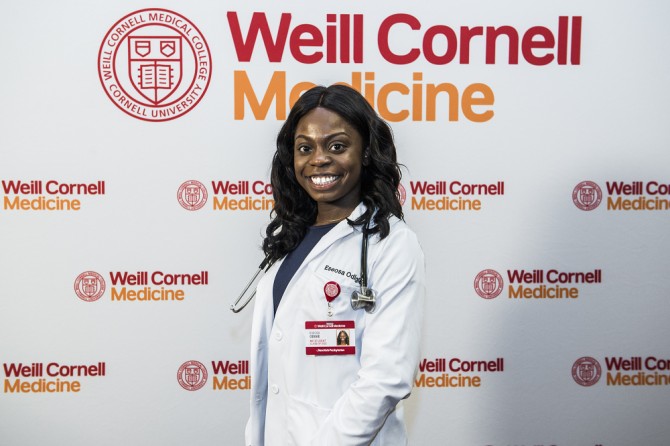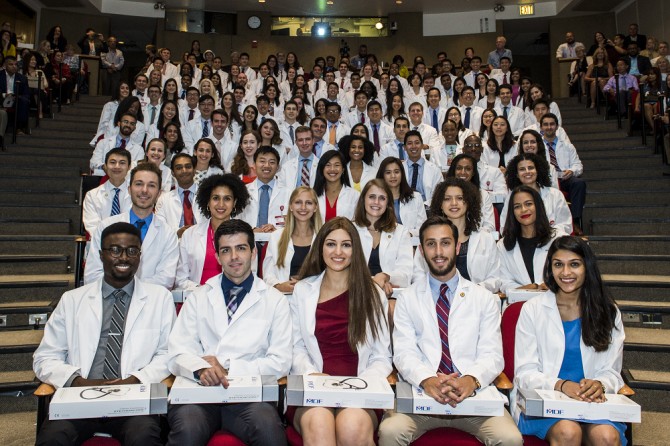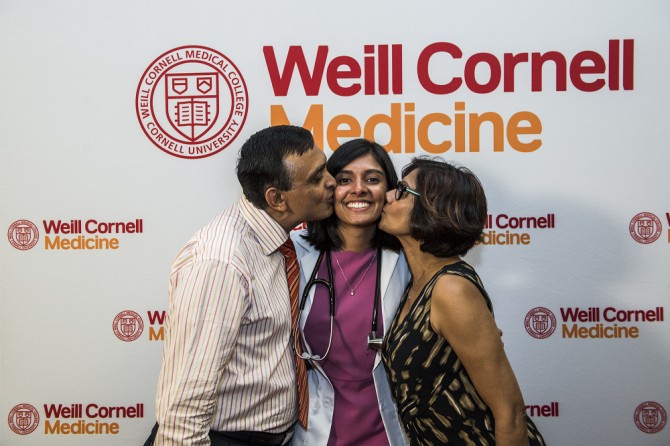
First-year students Amber Hamilton, left, Catherine Han, center, and Gregory Han, right, receive their white coats during Weill Cornell Medical College’s White Coat Ceremony on Aug. 21.
White Coat Ceremony marks first step in students’ medical careers
By Kathryn Inman Jamie Kass Alyssa Sunkin-Strube
For Eseosa Odigie ’17, the white coat is more than just a piece of clothing. It’s a symbol of the humbling responsibility of caring for patients and curing disease.
Odigie, a 22-year-old aspiring surgeon and daughter of Nigerian immigrants, dreamed of owning a white coat of her own, joining the medical ranks and dedicating her life to the service of others. So when she got the opportunity to do just that as a first-year medical student at Weill Cornell Medical College – Weill Cornell Medicine’s medical school – Odigie did the only thing that would make this achievement feel more personal: She had her name embroidered on her crisp, new coat.
On Aug. 21, Odigie and 105 of her classmates in the Class of 2022 received short white coats at the annual White Coat Ceremony. In front of friends and family in Uris Auditorium, students joined faculty members on stage to receive their new coats and stethoscopes – the former provided by the Moss Family Foundation, the latter through its Paul F. Miskovitz, M.D. ’75 Stethoscope Fund for Medical Students – officially marking the beginning of their medical education.
“To put my white coat on today means recognizing the sacrifice of my parents,” said Odigie, of Queens. “It means so much to see my own journey, what I’ve dreamed about becoming a reality. I see the future patients who I’ll take care of when I put on this white coat. I see the responsibility that I’ll now have with the white coat. Above all, I see a lot of sacrifice, a lot of resilience.”
The White Coat Ceremony is as much a rite of passage for aspiring physicians as it is a time to reflect on the journey that led to this moment and what lies ahead.
“I know this is a big milestone, both for our students and for their family members, loved ones and friends who supported them along the way,” said Dr. Augustine M.K. Choi, the Stephen and Suzanne Weiss Dean of Weill Cornell Medicine and provost for medical affairs of Cornell University. “You, our new students, are here because of your DNA, which fuels your passion, compassion and utmost dedication to becoming the best doctor you can be to heal your patients.”
Chayma Boussayoud, 24, of Brooklyn, knows firsthand how valuable a supportive community can be. As immigrants from Algeria, Boussayoud and her parents arrived in the United States not speaking English and with no support system in place. With sacrifice and hard work, they built a life for themselves and established meaningful relationships.
“A huge draw of Weill Cornell Medicine was how welcoming and inviting everyone was during the interview process and at Accepted Students Day,” she said. “I really appreciate the community here.”
The Class of 2022 adds to Weill Cornell Medicine’s diverse community. Its students hail from 18 countries and speak 29 languages. Women comprise more than half the class, and 24 percent are from groups that are underrepresented in medicine. Three students are graduates of the institution’s summer premedical programs, which expose minority and economically disadvantaged undergraduate students to science and medicine. Ten students are Cornell graduates and another 10 have earned master’s degrees; one has a doctorate. Now, as Weill Cornell students, they are joining a history of exemplary patient care, biomedical research and medical education.
“You’re receiving your white coats and joining a rich tradition of excellence at Weill Cornell Medicine that stretches back 120 years,” Choi said. “Since we were founded in 1898, both men and women have studied under the most distinguished clinicians and scientists in their field, and have gone on to achieve great things. We are thrilled that you will be continuing this legacy of collaboration, initiative and service that characterizes Weill Cornell Medicine.”
And above all, what unites them is a passion for medicine and a commitment to health and wellness.
“As an accomplished physician, you will be serving society by caring for patients, listening to them, comforting them, occasionally and hopefully more than occasionally curing them,” said Dr. Barbara Hempstead, senior associate dean for education and the O. Wayne Isom Professor of Medicine. “But you will also maintain a positive work-life balance, being a friend, a partner, potentially a parent. You will be an innovator, particularly those of you who will be delving into new scientific worlds. You will design new medical therapies and practices that impact patient care and population health.”
Just as important, these new aspiring physicians must keep in mind three essential principles that will guide them along their medical careers, said Dr. Laura Forese, executive vice president and chief operating officer of NewYork-Presbyterian and the White Coat Ceremony’s keynote speaker:
- Gratitude for the people who helped the first-year students reach this milestone; for the students’ medical school professors and the support they’ll get from classmates; and for the patients they will soon treat.
- Resilience in the face of challenges, from exams to the emotional weight that comes with caring for others.
- Respect for medicine’s rich tradition of treating everyone as a valuable human being.
“It is fair to say that the medicine you are going to practice is very sophisticated,” Forese said. “Just think about what’s going to happen in terms of technology, artificial intelligence, the diseases that we will be able to cure that today are deadly. What you are going to experience, what you are going to learn, what you are going to practice is definitely more sophisticated than anything I’ve been through.
“But I submit to you,” she said, “that the principles of how to be a good doctor – dare I say to be a good human being – go back to some very simple concepts: gratitude, resilience and respect.”
Joined by his mother and brother, Seattle-native Jonathan Yu was thrilled to be donning his white coat, which to him represents new opportunity. For a long time, the 24-year-old thought he might go into a different field, pursuing various avenues like business administration and policy, but he finally realized that the practice of medicine was unique in its ability to help others. As he developed an interest in oncology, he felt that Weill Cornell, with its cancer care and research programs and collaboration with Memorial Sloan Kettering Cancer Center, would be a perfect fit.
“Working with patients is incredibly fulfilling,” he said. “I’ve tried a bunch of different things. But at the end of the day when I look back at what I do, I think interacting with patients and being able to really help on a personal level, in terms of health, is something that not many other professions give you the opportunity to do. That’s the main reason I want to practice medicine.”
As one of the 10 Cornell graduates in the Class of 2022, Odigie was excited to come to Weill Cornell for her medical studies – the natural next step in her career.
“As a Cornell grad, I definitely felt the family aspect when I came to Weill Cornell to be a Double Red,” she said. “And just the opportunity to do so much. Patient care, research and educating others and mentorship – I found that all here. Coming from Cornell, it felt natural coming back.”
Kathryn Inman, associate editor; Jamie Kass, science writer; and Alyssa Sunkin-Strube, newsroom manager, Weill Cornell Medicine Office of External Affairs.
Media Contact
Get Cornell news delivered right to your inbox.
Subscribe



